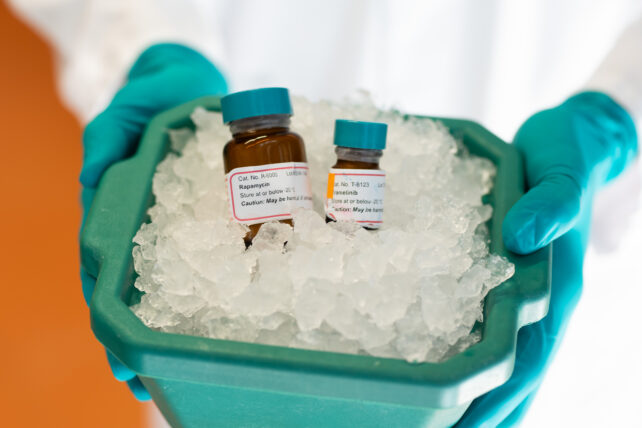Scientists in Europe have tested an anti-aging drug cocktail in mice and found that it extended the animals' lifespans by around 30 percent. The mice stayed healthier for longer too, with less chronic inflammation and delayed cancer onset.
The two drugs are rapamycin and trametinib, which are both used to treat different types of cancer. Rapamycin is also often used to prevent organ rejection, and has shown promise in extending lifespans in animal tests. Trametinib, meanwhile, has been shown to extend the lifespan of fruit flies, but whether that worked in larger animals remained to be seen.
So for a new study, a research team led by scientists from the Max Planck Institute in Germany investigated how both drugs, on their own and together, could extend lifespan in mice.
True to its reputation, rapamycin alone was found to extend the lifespan of mice by 17 to 18 percent. Trametinib wasn't too bad either, boosting longevity by 7 to 16 percent. But when their powers combined, treated mice saw a significant lifespan extension of around 26 to 35 percent.

The extra time added to the animals' lifespans weren't merely offset by frailty and illness, though. The combo treatment delayed the growth of liver and spleen tumors in the mice, and reduced age-related inflammation in the brain, kidney, spleen, and muscle. The animals seemed to be more active at advanced ages compared to control mice, with reduced body weight and a slower decline in heart function.
As intriguing as the results are, we shouldn't expect to be able to pop some pills and live to 130. Instead, the most promising aspect for human applications might be in improving the quality of our twilight years.
"While we do not expect a similar extension to human lifespans as we found in mice, we hope that the drugs we're investigating could help people to stay healthy and disease-free for longer late in life," says geneticist Linda Partridge, co-senior author of the study.
"Further research in humans in years to come will help us to elucidate how these drugs may be useful to people, and who might be able to benefit."
To test the drugs, the researchers fed hundreds of mice regular doses of rapamycin, trametinib, or both from six months of age, and measured their survival for the rest of their lives. While benefits were seen from either drug alone, the best outcomes came from the combined treatment.
Median lifespans were increased by 34.9 percent in female mice and 27.4 percent in males, while maximum lifespans increased by 32.4 percent in females and 26.1 percent in males.
The team says that the benefits of the drug combo don't seem to be simply down to a higher dose. Although both drugs act on the same signaling pathway – known as the Ras/Insulin/TOR network – they target different points. When the researchers analyzed gene expression, they found certain changes only occur when both drugs are given.
Importantly, no extra side effects were seen from combining the drugs, outside of those already known for each alone.
Human trials for the drug combo could begin relatively soon. Both drugs are already approved for use in humans in the US and European Union, with anti-aging benefits hinted at in previous studies. Rapamycin, for example, seemed to extend the fertility of perimenopausal women by up to five years in one recent study.
The research was published in the journal Nature Aging.
